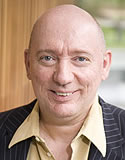FULL STORY
NIH Awards Einstein Researcher $11.2 Million to Study Genome Instability as a Cause of Aging
August 27, 2009 — (BRONX, NY) — The National Institutes of Health (NIH) has awarded Albert Einstein College of Medicine of Yeshiva University a five-year, $11.2 million grant to study the impact of damage to DNA on aging and disease. Research funded by this grant, and conducted by a consortium of scientists, could reveal the role of genome maintenance systems in delaying aging and will begin to explore novel interventions to maintain health in old age.

Jan Vijg, Ph.D.Led by Jan Vijg, Ph.D., chairman of genetics at Einstein, the research project will build on the consortium's previous, internationally recognized work involving mice that undergo accelerated aging. This research has shown that interfering with the cellular processes responsible for DNA repair leads to what appears to be premature aging in these animals. These results indicate that accumulating DNA errors may underpin the aging process.
The investigators in the consortium now plan to see if treatments based on these results can extend life spans of mice bred to have short lives. "We can try to use interventions that are based on alleviating DNA damage," Dr. Vijg says. "One approach, for example, could be the use of antioxidants, which neutralize free radicals, the chemicals that contribute to DNA damage."
Altogether, the research project involves four main areas of study:
- unraveling the mechanisms that lead from DNA damage to premature as well as normal aging
- testing the role of DNA maintenance and repair as a pro-longevity system in humans
- developing sets of blood-based biomarkers that indicate premature aging in mouse models, and validate these biomarkers in normally aging mice and in humans
- developing new, experimental interventions that neutralize symptoms of premature aging in the short-lived mice
The NIH program project grant has funded five groups of scientists who are working on interrelated parts of the project's four research areas. In addition to Dr. Vijg's group, another Einstein team is headed by Yousin Suh, Ph.D., associate professor of medicine, and of genetics.

Yousin Suh, Ph.D.Dr. Suh will take advantage of a unique Einstein resource: tissue samples from Ashkenazi Jewish centenarians — living to age 100 and beyond. Using this relatively homogeneous population, brought together by her Einstein collaborator, Nir Barzilai, M.D., Dr. Suh will look for gene variations that are associated with longevity. Her team will test these "longevity genes" by inserting them into otherwise ordinary human cells and then observing whether the inserted genes improve cellular function.
The other groups of investigators are affiliated with: the Buck Institute for Age Research in Novato, CA, studying the genetic causes of cell senescence (led by Dr. Judy Campisi); the Erasmus University Medical Center in Rotterdam, the Netherlands, developing biomarkers and studying interventions in DNA repair-defective mouse models (led by Dr. Jan Hoeijmakers); and the University of Texas Health Science Center in San Antonio, TX, also working with DNA repair-defective mouse models (led by Dr. Paul Hasty). Finally, the National Institute of Public Health and the Environment, in Bilthoven, the Netherlands, harbors the central core facility with all the mouse models kept under standardized, germ-free conditions (led by Dr. Harry van Steeg).
The information developed by the Einstein project may help to unravel one of the major mechanisms through which we age, which in turn may lead to new approaches to intervene on a rational basis. "Ultimately," says Dr. Vijg, "our hope is that this research will lead to new strategies that can be deployed for delaying, preventing, or even curing age-related disease."
Other Top Stories
9/11 World Trade Center Exposure Linked to Heart Disease Among NYC Firefighters
On Becoming a Physician: New Einstein Students Receive White Coats and Stethoscopes
Novel Therapy for Acute Migraine Shows Promise in Phase 3 Clinical Trial
First Complete Wiring Diagram of an Animal's Nervous System
Multimillion Dollar NIH Grant to Help Reduce Opioid Use & Get Care to People Who Need It
NIH Grant Funds $23 Million Study of Diseases Affecting People Living with HIV
New TAILORx Data Guides Adjuvant Therapy in Younger Breast Cancer Patients
Einstein Celebrates Its 61st Commencement
Bolstering Biopsies: Testing Patients' Individual Cells to Guide Treatment



Tablet Blog